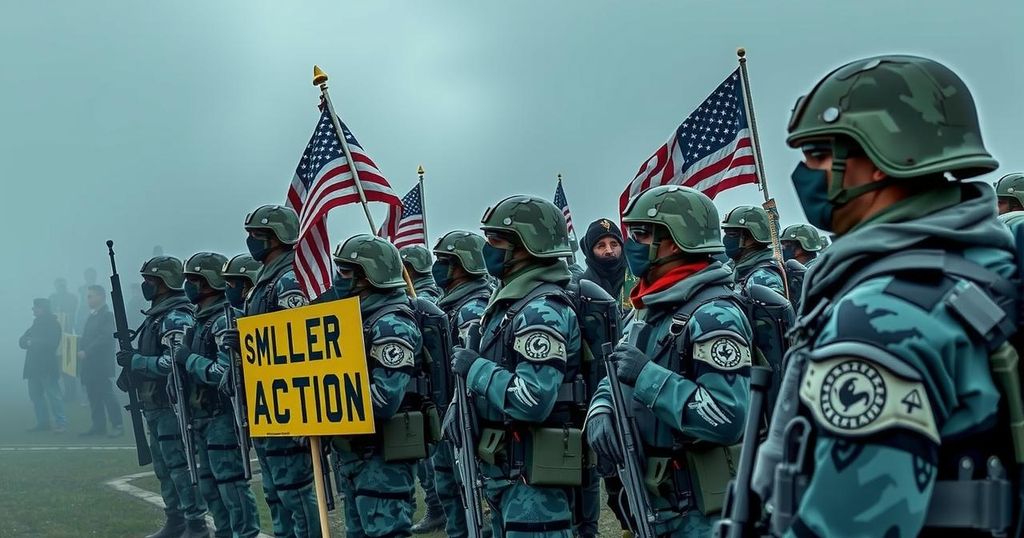Climate change
ACTIVISM, AFRICA, AMY GOODMAN, ASIA, ASIAN PEOPLES ’ MOVEMENT, ASIAN PEOPLES ’ MOVEMENT ON DEBT AND DEVELOPMENT, AZERBAIJAN, BAKU, CAMPAIGN TO, CLIMATE CHANGE, GENOCIDE, GLOBAL CAMPAIGN TO DEMAND CLIMATE JUSTICE, HUMAN RIGHTS, ISRAEL, JANA RASH, JANA RASHED, LEBANON, LEE, LEENA EISA, LID, LIDY NACPIL, NORTH AMERICA, SUDAN, U. N, UNITED STATES
Leila Ramsay
0 Comments
Activists at COP29 Demand Climate Action Against Militarism and Genocide
At COP29, activists held a demonstration called “Pay Up, Stand Up: Finance Climate Action, Not Genocide,” drawing attention to the intersection of climate justice and military aggression. Participants, including Lidy Nacpil, Jana Rashed, and Leena Eisa, called for an end to ongoing violence in Palestine, Lebanon, and Sudan, emphasizing the dire impact of such actions on the environment and the necessity for international accountability.
At COP29 in Baku, Azerbaijan, civil society activists held a significant demonstration titled “Pay Up, Stand Up: Finance Climate Action, Not Genocide.” This event, which took place outside the U.N. negotiation rooms, aimed to draw attention to the intersection of climate justice and military aggression, particularly towards Palestinians suffering from Israeli military actions. Prominent activists, including Lidy Nacpil, Jana Rashed, and Leena Eisa, emphasized the urgent need to address the ongoing violence and ecological destruction that accompany such conflicts.
Lidy Nacpil, co-chair of the People’s Plenary and a seasoned climate activist, highlighted the restrictive policies at the conference that hinder proper discourse regarding government misconduct. She expressed solidarity within civil society, stating, “We wanted first to feel our power of solidarity together,” showcasing the collective strength of voices advocating for justice.
Jana Rashed, a Palestinian advocate, spoke about the devastating effects of military actions on the environment in her homeland, noting that pollution and ecological destruction are direct consequences of warfare. She called for a global energy embargo against countries that support Israeli actions, thereby contributing to genocidal acts. Rashed underscored the hypocrisy of discussing climate justice while ignoring such severe injustices.
Similarly, Leena Eisa, a climate justice advocate from Sudan, brought attention to the brutal reality of the ongoing genocide in her country. She articulated the plight of Sudanese citizens suffering from violence and neglect, saying, “There’s no one here to — like, we are here not, like, to leave anyone behind.” Eisa stressed the urgent need for international action to cease support for the oppressive regimes causing suffering in their nations, calling for a halt to the violence and a focus on humanitarian needs.
The demonstration served as a poignant reminder that climate justice cannot be discussed in isolation from global conflicts and injustices. Through their voices and actions, the activists at COP29 sought to unify their causes for environmental reform and justice against militaristic aggression, standing firmly against what they identified as systemic neglect of marginalized communities in the climate discourse.
The backdrop of the People’s Plenary at COP29 highlights the growing concerns over the connection between militarism, human rights abuses, and environmental degradation. Activists argue that raising awareness about these interlinked issues is essential to achieving genuine climate justice. The global climate summit context underscores the need for reparative climate finance and accountability, particularly towards nations in the Global South suffering from both ecological and human rights crises caused by militaristic aggression. The participants also stressed the role of civil society in addressing these pressing issues amidst restrictions on free speech and the ability to openly criticize states, which can stifle necessary dialogue and accountability.
In conclusion, the events at COP29 illuminated the vital links between climate action, human rights, and military aggression. Activists like Lidy Nacpil, Jana Rashed, and Leena Eisa exemplified the urgent need for collective efforts to address injustices worldwide. Their rallying cry at the plenary not only championed the cause of climate action but also implored the global community to recognize and dismantle the systems perpetuating violence and ecological devastation.
Original Source: www.democracynow.org




Post Comment